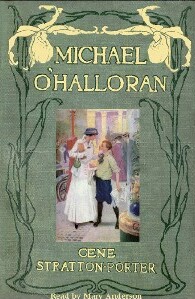
Michael O'Halloran is a novel by Gene Stratton-Porter.
This book contains examples of:
- Aristocrats Are Evil: Discussed. Leslie blames a woman's behavior on aping nobility, but Douglas corrects that only some of them are like that."I don't pity him half so much as I do her," he answered. "What must a woman have suffered or been through, to warp, twist, and harden her like that?"
"Society life," answered Leslie, "as it is lived by people of wealth who are aping royalty and the titled classes."
"A branch of them—possibly," conceded Douglas. "I know some titled and wealthy people who would be dumbfounded over that woman's ideas." - Blue Blood: Minturn, having gotten control of his sons after his wife made them into Royal Brats, knows it will be a long slog, but has hopes because they are "handsome little chaps with fine bodies and good ancestry".
- Deep Sleep: Mickey is terrified by how deeply Peaches sleeps the night after he brings her home.
- A Friend in Need: Douglas, in the opening, intervenes when Mickey is about to fight a boy twice his size for cheating him, and makes the other boy cough up the money. Shortly thereafter, Mickey takes in the crippled girl Peaches to prevent her going to the Orphanage of Fear.
- Idle Rich: Douglas recounts how a friend of his is training an orphan waif to follow him in his business, because while he has sons, his rich wife is training them to be "men of wealth and leisure".
- Incorruptible Pure Pureness: Mickey.
- Indian Maiden: Douglas specifically points out that the woman who made the gorgeous basket does not fit the trope: "I wish I might truthfully report an artist's Indian of the Minnehaha type".
- Kick Them While They Are Down: Mickey recounts how a nurse abused a little girl, one of her charges, and then one of her brothers kicked her when she was down. He did not know any street kid who would kick a little girl when she'd been beat up.
- Magical Nanny: A magical tutor straightens out two violent Royal Brats in about a day.
- Meaningful Name: Mickey's name is lampshaded to ensure the audience knows the meaning.The big fellow called him 'Mickey'; no doubt a mother who adored him named him Michael, and thought him 'like unto God' when she did it.
- Meaningful Rename: Mickey renames Peaches to Lily."Lily!" he repeated. "Little snow white lily! Peaches is a good name for you if you're referring to sweetness, but it doesn't fit for colour."
- Officer and a Gentleman: Cited to counter the argument of a Royal Brat that gentlemen don't work.If the world has any gentlemen it surely should be those born for generations of royal and titled blood, and reared from their cradles in every tradition of their rank. Europe is full of them, and many are superb men. I know a few. Now will you tell me where they are to-day? They are down in trenches six feet under ground, shivering in mud and water, half dead for sleep, food, and rest, trying to save the land of their birth, the homes they own, to protect the women and children they love. They are marching miles, being shot down in cavalry rushes, and blown up in boats they are manning, in their fight to save their countries.
- Orphanage of Fear: Mickey's mother had raised him to be able to look after himself because otherwise he would be taken to the home. When he meets Peaches after her granny died, other boarders are talking of how the girl will be taken to the home, and she's terrified.
- Parental Abandonment: Mickey's father died of drink, and then his mother, with no cause given. Near the opening of the story, he meets a crippled girl named Peaches, whose granny died and so will be taken to the Home.
- Royal Brat: Minturn's sons after they were effectively brought up by a violently abusive nurse. When Minturn gets evidence that lets him pry them free from their mother, he is quite aware that much will be needed to straight them out.
- Rules of Orphan Economics: Mickey works odd jobs to support himself. Given the time frame, children worked then. He was working even before his mother's death, and she had carefully prepared him to live on his own.
- Silly Rabbit, Idealism Is for Kids!: Douglas gets this when he rejects an offical position."It is painful to a man of experience to see you young fellows of such great promise come up and 'kick' yourself half to death 'against the pricks' of established business, parties, and customs, but half of you do it. In the end all of you come limping in, poor, disheartened, defeated, and then swing to the other extreme, by being so willing for a change you'll take almost anything, and so the dirty jobs naturally fall to you."
- Street Urchin: Mickey, of the odd jobs variety. He still lives in the apartment where he had lived with his mother; she had been at pains to teach him how, so he could escape the Orphanage of Fear.
- Wrong Side of the Tracks: Both Peaches and Mickey, though Peaches more so, to the extent that when she comes to live with Mickey she regards it as a signficant step up in the world.
